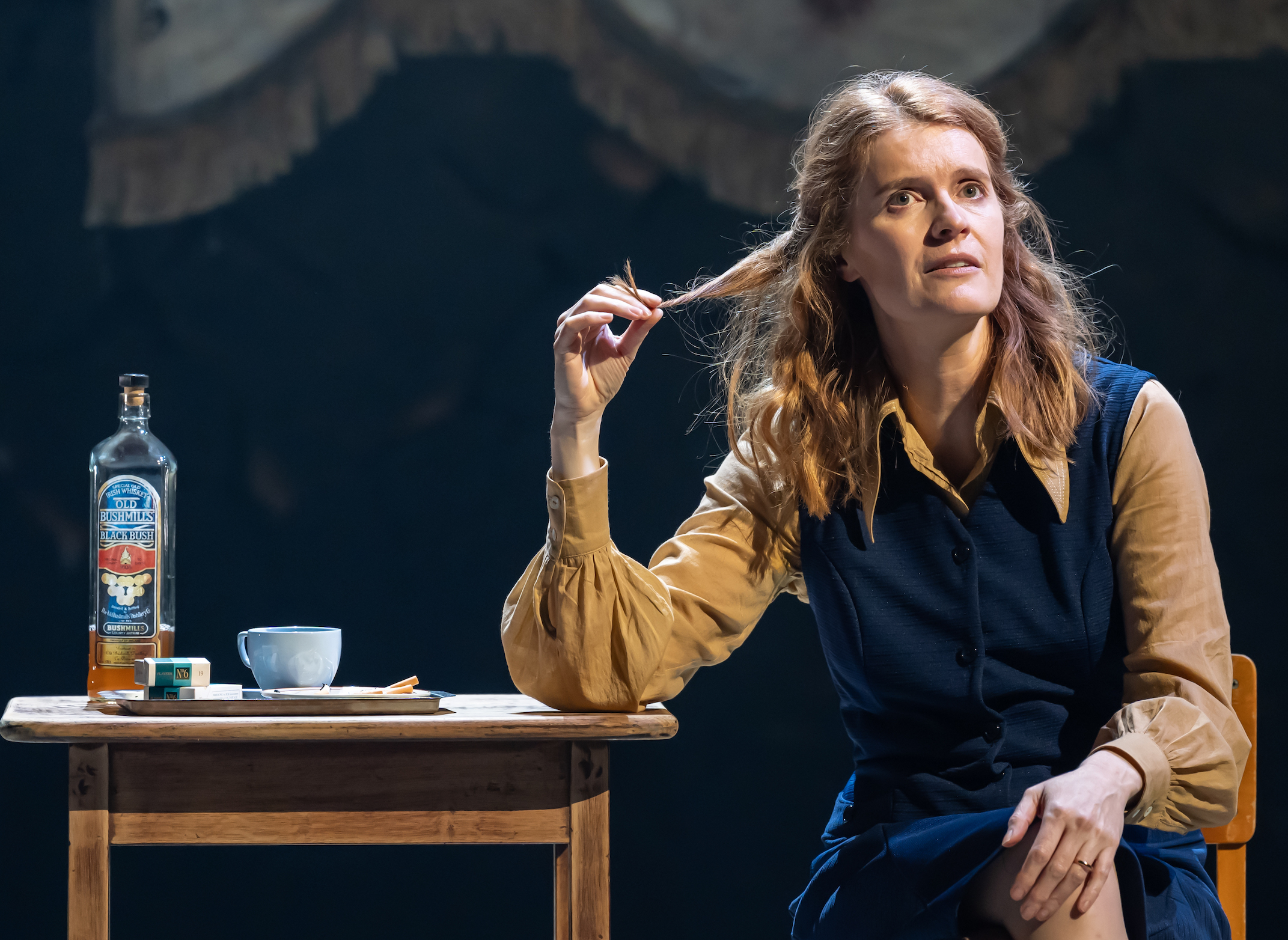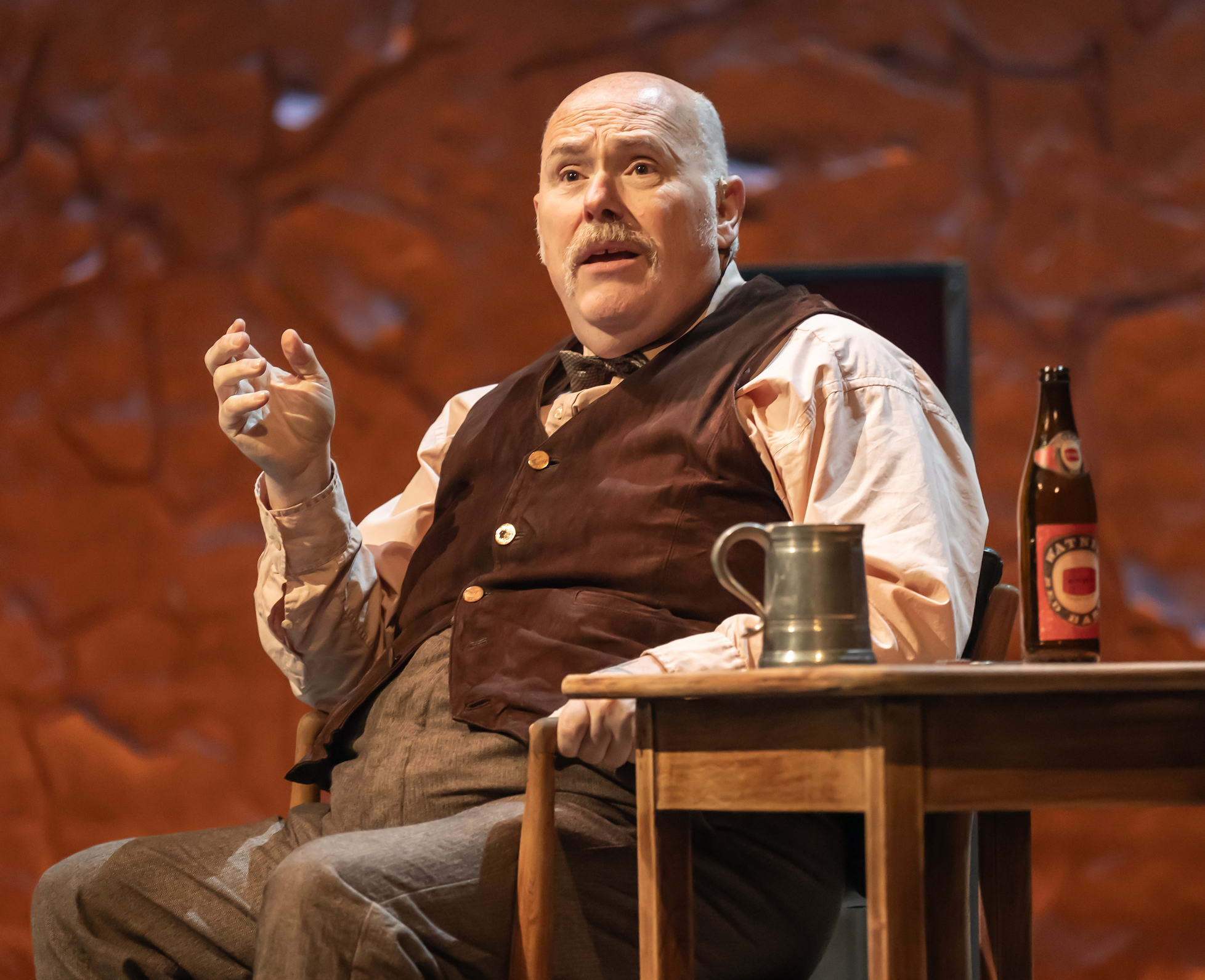Faith Healer, Lyric Hammersmith review - Brian Friel's masterpiece works its magic again | reviews, news & interviews
Faith Healer, Lyric Hammersmith review - Brian Friel's masterpiece works its magic again
Faith Healer, Lyric Hammersmith review - Brian Friel's masterpiece works its magic again
Director Rachel O'Riordan finds lighter moments in a tale of grief

Brian Friel’s Faith Healer isn’t noted for its laughs, but Rachel O’Riordan has found more than most directors do in this rich, masterly piece from 1979. Her approach pays dividends in all but one respect.
No portrayal of the deep melancholy of a blighted soul speaks more eloquently than the one Friel has fashioned for his leading man, “The Fantastic Francis Hardy — Faith Healer — One Night Only”, as the poster proclaims. His ramshackle life drags those who love him around the backwaters of Great Britain, though not of his native Ireland, to which he returns only for family deaths. The incantatory list of all the benighted villages where he has “performed", scattered around Wales and Scotland, bursts into the text throughout, an eerie countdown to something terrible.
In the first of the play’s four monologues, Frank, as he is known to his associates, starts the narrative ball rolling, hinting it will end up one dark day in a pub in County Donegal, while he is making a rare trip home. He confesses many things about himself — his despair and drinking as his gift for healing, always sporadic, began to die away. And he sketches portraits of the two people accompanying his performances: his “muleish mistress", Grace, and his dogged manager, Teddy, whose Cockney accent and mannerisms he amusingly has down to a T.
 We hear their monologues next, before Frank returns for his final act. As soon as Justine Mitchell's Grace (pictured right) starts talking, we realise this is a puzzle play, where we will have to weigh up the three characters' competing versions of what has actually happened. All are compelling talkers. Slowly, through their booze-sodden accounts, certain truths and sources of grief are uncovered, some of them chilling.
We hear their monologues next, before Frank returns for his final act. As soon as Justine Mitchell's Grace (pictured right) starts talking, we realise this is a puzzle play, where we will have to weigh up the three characters' competing versions of what has actually happened. All are compelling talkers. Slowly, through their booze-sodden accounts, certain truths and sources of grief are uncovered, some of them chilling.
Friel inserts little markers into this glorious sea of words, details each character repeats that anchor us to their shared experiences, even if they view them differently: the village in Sutherland they visit that’s “as far north as you can go in Scotland”; the crossing from Stranraer to Larne and the drive through the night to the pub in Co Donegal that’s “more a lounge bar, really”. Ballybeg is the nearest village, they all tell us, familiar Friel territory; but Frank has arrived in a zone where savagery rules.
It becomes clear that he has turned into a creator of what Grace calls “fictions”, foregrounding only the successes in his life and refashioning them into myths he can live with, jettisoning the rest: his few cures are overly emphasised, his remarks to her an often cruel repertoire of putdowns from which she learns to shield herself. But Grace has also learned that she needs him to sustain her. (Psychologists would be writing “classic co-dependency” in their notes at this point.) It’s a poignant portrait of a woman running after a man who's running away from himself and only feels whole on the few occasions when he actually can heal somebody. Worse for him is that he knows instantly whether or not he can cure somebody but has to go through the charade of trying when he knows there’s no point.
As the piece proceeds, the notion of a "faith healer" twists and turns. Is Frank actually one? Or he is closer to being an "artist," as Grace sees him, desperate to sustain his vision as his self-doubt erodes and he starts to lose faith in his calling? By the final moments of the play he has found an odd elation in accepting a fate he can’t control, his arms held out, Christlike, his faith in himself restored.
Justine Mitchell as Grace gives the most pitch-perfect interpretation of this role I have seen. We meet her in a Paddington bedsit, jittery and broken, measuring out her life in hours slept, whiskey drunk, cigarettes smoked. Yet she is still a believable beauty from a big house with a long poplared drive, who trained at the bar and adored her patrician father, a judge. When she visited him after his stroke, she recalls, he condemned her for running off with her “mountebank” in the familar flow of words he'd used while sentencing a prisoner in the dock. Without a trace of faux-neurosis, Mitchell takes us deep into Grace’s private world of pain and her love-hate relationship with Frank. She is sadness incarnate, a once-strong woman running on empty.
 By contrast, the monologue from Holder's Teddy (pictured left) is a knockabout comic tour de force. As the English manager who couldn’t abandon his two charges, he is blinded by love for them, however often he repeats his mantra, “Work is work, friends is friends, and never the twain shall meet, as the poet said.” Lubricated by bottles of beer, he becomes louder and camper, his voice suddenly a screeching fortissimo, his gestures studied playacting as he croons along to “The Way You Look Tonight” — the only record Frank owned — and conducts an imaginary band. He evokes a bygone era of music-hall, turned up to 11, where whippets play bagpipes and ladies do turns with pigeons, in absurdist comic writing of the highest order.
By contrast, the monologue from Holder's Teddy (pictured left) is a knockabout comic tour de force. As the English manager who couldn’t abandon his two charges, he is blinded by love for them, however often he repeats his mantra, “Work is work, friends is friends, and never the twain shall meet, as the poet said.” Lubricated by bottles of beer, he becomes louder and camper, his voice suddenly a screeching fortissimo, his gestures studied playacting as he croons along to “The Way You Look Tonight” — the only record Frank owned — and conducts an imaginary band. He evokes a bygone era of music-hall, turned up to 11, where whippets play bagpipes and ladies do turns with pigeons, in absurdist comic writing of the highest order.
It falls to Declan Conlon as Frank to knit the piece together, and it’s here the production’s comparative lightness of spirit sells it slightly short. Everything you need is there in Conlon’s performance — Frank's wit and swagger, the quick delivery of a consummate conman, his serious confessional bursts — everything except, crucially, a sense of danger, of a soul flaming out. If you never saw Donal McCann or Ralph Fiennes in the role, that might not matter, but I missed the brooding, almost demonic melancholy they brought to the character.
Even so, this is another fine achievement for O’Riordan’s Lyric, after her exceptional Beauty Queen of Leenane: an infinitely rewarding piece of theatre that makes the text work its magic all over again.
rating
Explore topics
Share this article
The future of Arts Journalism
You can stop theartsdesk.com closing!
We urgently need financing to survive. Our fundraising drive has thus far raised £49,000 but we need to reach £100,000 or we will be forced to close. Please contribute here: https://gofund.me/c3f6033d
And if you can forward this information to anyone who might assist, we’d be grateful.

Subscribe to theartsdesk.com
Thank you for continuing to read our work on theartsdesk.com. For unlimited access to every article in its entirety, including our archive of more than 15,000 pieces, we're asking for £5 per month or £40 per year. We feel it's a very good deal, and hope you do too.
To take a subscription now simply click here.
And if you're looking for that extra gift for a friend or family member, why not treat them to a theartsdesk.com gift subscription?
more Theatre
 Wendy & Peter Pan, Barbican Theatre review - mixed bag of panto and comic play, turned up to 11
The RSC adaptation is aimed at children, though all will thrill to its spectacle
Wendy & Peter Pan, Barbican Theatre review - mixed bag of panto and comic play, turned up to 11
The RSC adaptation is aimed at children, though all will thrill to its spectacle
 Hedda, Orange Tree Theatre review - a monument reimagined, perhaps even improved
Scandinavian masterpiece transplanted into a London reeling from the ravages of war
Hedda, Orange Tree Theatre review - a monument reimagined, perhaps even improved
Scandinavian masterpiece transplanted into a London reeling from the ravages of war
 The Assembled Parties, Hampstead review - a rarity, a well-made play delivered straight
Witty but poignant tribute to the strength of family ties as all around disintegrates
The Assembled Parties, Hampstead review - a rarity, a well-made play delivered straight
Witty but poignant tribute to the strength of family ties as all around disintegrates
 Mary Page Marlowe, Old Vic review - a starry portrait of a splintered life
Tracy Letts's Off Broadway play makes a shimmeringly powerful London debut
Mary Page Marlowe, Old Vic review - a starry portrait of a splintered life
Tracy Letts's Off Broadway play makes a shimmeringly powerful London debut
 Little Brother, Soho Theatre review - light, bright but emotionally true
This Verity Bargate Award-winning dramedy is entertaining as well as thought provoking
Little Brother, Soho Theatre review - light, bright but emotionally true
This Verity Bargate Award-winning dramedy is entertaining as well as thought provoking
 The Unbelievers, Royal Court Theatre - grimly compelling, powerfully performed
Nick Payne's new play is amongst his best
The Unbelievers, Royal Court Theatre - grimly compelling, powerfully performed
Nick Payne's new play is amongst his best
 The Maids, Donmar Warehouse review - vibrant cast lost in a spectacular-looking fever dream
Kip Williams revises Genet, with little gained in the update except eye-popping visuals
The Maids, Donmar Warehouse review - vibrant cast lost in a spectacular-looking fever dream
Kip Williams revises Genet, with little gained in the update except eye-popping visuals
 Ragdoll, Jermyn Street Theatre review - compelling and emotionally truthful
Katherine Moar returns with a Patty Hearst-inspired follow up to her debut hit 'Farm Hall'
Ragdoll, Jermyn Street Theatre review - compelling and emotionally truthful
Katherine Moar returns with a Patty Hearst-inspired follow up to her debut hit 'Farm Hall'
 Troilus and Cressida, Globe Theatre review - a 'problem play' with added problems
Raucous and carnivalesque, but also ugly and incomprehensible
Troilus and Cressida, Globe Theatre review - a 'problem play' with added problems
Raucous and carnivalesque, but also ugly and incomprehensible
 Clarkston, Trafalgar Theatre review - two lads on a road to nowhere
Netflix star, Joe Locke, is the selling point of a production that needs one
Clarkston, Trafalgar Theatre review - two lads on a road to nowhere
Netflix star, Joe Locke, is the selling point of a production that needs one
 Ghost Stories, Peacock Theatre review - spirited staging but short on scares
Impressive spectacle saves an ageing show in an unsuitable venue
Ghost Stories, Peacock Theatre review - spirited staging but short on scares
Impressive spectacle saves an ageing show in an unsuitable venue
 Hamlet, National Theatre review - turning tragedy to comedy is no joke
Hiran Abeyeskera’s childlike prince falls flat in a mixed production
Hamlet, National Theatre review - turning tragedy to comedy is no joke
Hiran Abeyeskera’s childlike prince falls flat in a mixed production

Add comment